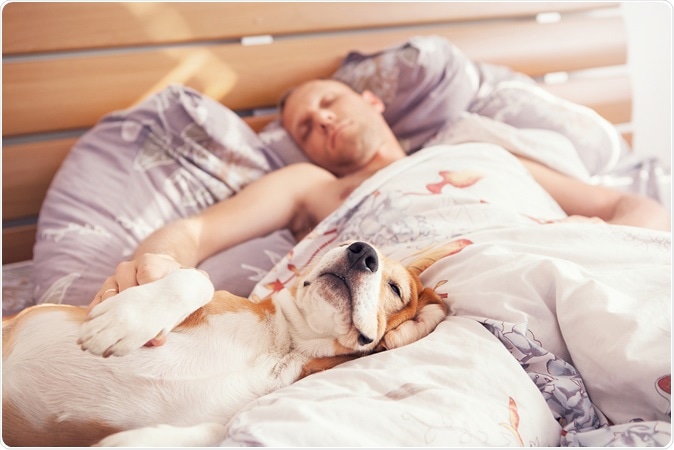A new study attempted to assess whether having a dog in the bedroom or sharing a bed with a dog helps or disturbs sleep. For this Mayo Clinic study, the team of researchers looked at several healthy individuals between August 1, 2015 and December 31, 2015 and evaluated their sleep quality. The study entitled “The Effect of Dogs on Human Sleep in the Home Sleep Environment,” was published in Mayo Clinic Proceedings.
As per the record of the American Veterinary Association, over 40 million Americans have a family dog and of these around 63 percent consider their dogs to be their family. Lois Krahn, a sleep medicine specialist at the Center for Sleep Medicine on Mayo Clinic’s Arizona campus, and an author of the study, said that most people believe that having the dog in the bedroom can disrupt sleep. However many still find it comforting to have their pets with them while sleeping.

Your dog in your bed with you – is it good for your sleep? Image Credit: Soloviova Liudmyla / Shutterstock
To measure the sleep effectiveness, the study team included 40 healthy adults who had no diagnosed sleep disorder and their dogs. In the study population 88 percent were women and the average age of the participants was around 44 years. Their average body mass index (BMI) was around 25 kg/m2. The dogs included in the study were of an average age of around 5 years and their average weight was around 15 kg. The quality of sleep among the adults who slept with their dogs was measured using a device called an accelerometer which is essentially an activity tracker. Their partner dogs wore an accelerometer too but this was customized especially for dogs. The duration of study for each participating pair of human and dog was 7 nights.
Results from the study showed that the humans spent an average 478 minutes in bed and their total sleep time was an average of 404 minutes. The sleep efficiency on an average was found to be around 81 percent. Around 71 minutes were spent as wake time after sleep onset. On measuring the dogs’ accelerometer for their activity, they had an average period of rest of 413 minutes while they remained active for an average of 62 minutes and played for 2 minutes on average. The sleep efficiency of the dogs was an average of around 85 percent. The authors of the study concluded that sleep efficiency of the humans was significantly lowered if the dog was on the bed or co-shared the bed compared to simply being in the bedroom. It was previously suspected that presence of the dog in the bedroom could disrupt sleep. This study proves that mere presence of the dog in the bedroom does not affect sleep.
Dr. Krahn explained that the relationship between human owners and their canine pets has changed with time. And this has resulted in more pets in the bedrooms. Since most owners are away at work for most of the day, they kind of make up for their absence by having their pets in the bedroom with them. This study just proves that having their pets in the bedroom per se does not affect their sleep in a negative way.
Source: http://www.mayoclinicproceedings.org/article/S0025-6196(17)30486-X/fulltext